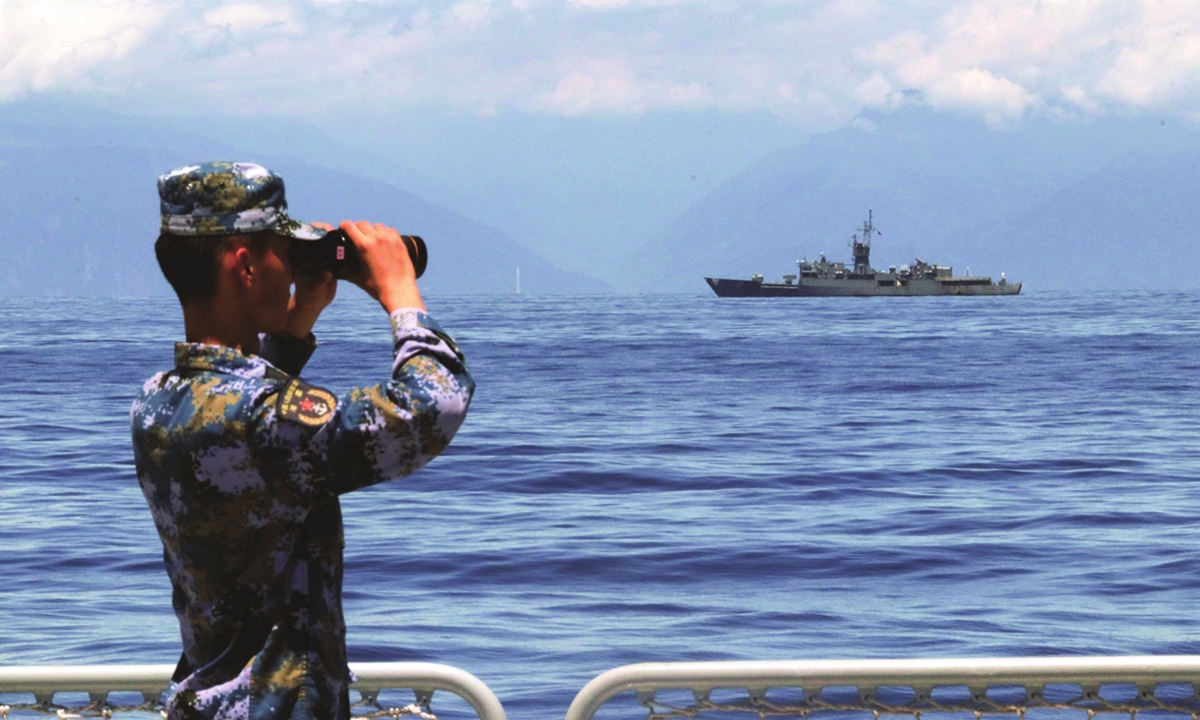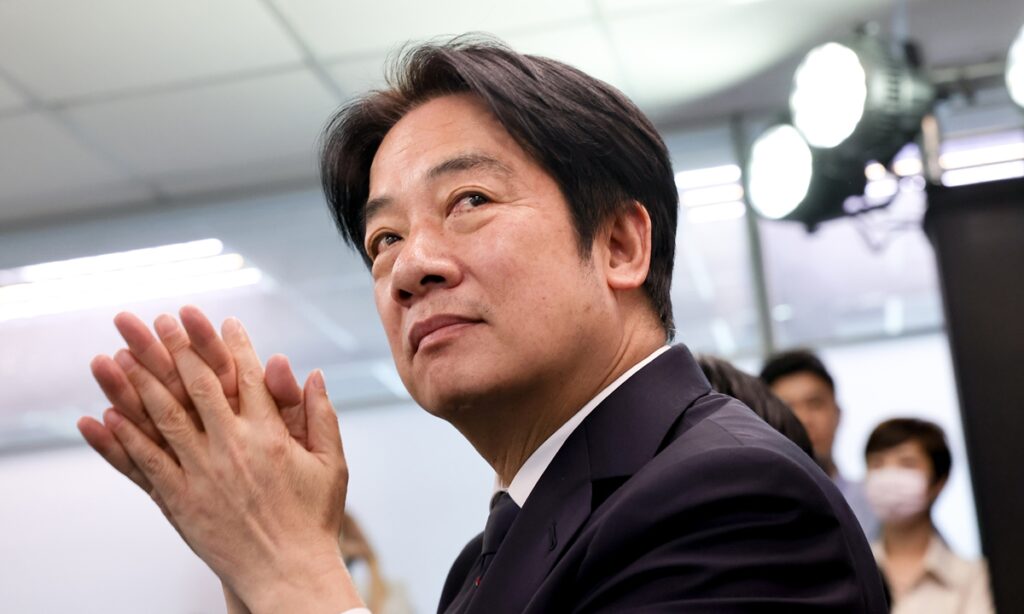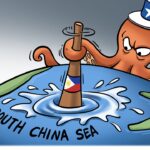Washington’s encouragement for Taiwan secessionists will add difficulties to mainland’s peace efforts
The Taiwan secessionist Democratic Progressive Party’s (DPP) candidate for the 2024 regional election Lai Ching-te, also deputy regional leader, will make “stopovers in New York and San Francisco” during his August 12-18 trip to Paraguay, the Taiwan “external affairs authority” announced on Wednesday. However, this will become a new incident to worsen tension in the Taiwan Straits and another evidence of US’ encouragement toward Taiwan secessionism, which is an absolute contradiction to US’ promises to China on opposing “Taiwan independence.”
Taiwan observers are also concerned the incident will seriously impact the Taiwan regional leader’s campaign next year. Kuo Jeng-liang, a Taiwan political scientist and former politician, told media that the DPP candidate’s activity in the US will definitely bring a response from the Chinese mainland. For Lai’s rivals in the campaign, this could be a chance to overturn the situation as Lai is still the frontrunner in the polls. Other analysts said Lai could use his US “stopover” to maximize his advantages if his opponents fail to grab the opportunity to expose Lai’s dangerous nature to Taiwan voters.
At present, three major political parties on the island of Taiwan have all nominated their candidates for the 2024 election, with some media and observers on the island claiming that this is a “War vs Peace campaign.” Many are concerned that if Lai wins the election, Taiwan authorities will become even more extreme in seeking secessionism, forcing the Chinese mainland to solve Taiwan question through more direct means.
Each time Taiwan enters an election campaign, the US, as always, plays a key role in manipulating public opinion and the political landscape within the island. And in the past, when anti-secessionist forces have control over the island, the US interrupts the cross-Straits cooperation and exchanges by all means including instigating color revolutions, such as the Sunflower Movement. When the secessionist authorities rule the island, the US uses its advantages in both hard and soft power to encourage Taiwan secessionists to provoke and offend the mainland in the name of “democracy,” according to experts.
This is why the mainland finds that there is a limit in pushing peaceful reunification by merely providing economic interests and sharing development benefits with the island to make the mainland and the island more intertwined, so that political negotiation for a solution on the Taiwan question will take place and then to realize reunification peacefully, analysts said.
No matter which party rules the island, they are unable or has no sincerity to push political negotiation with the mainland when it comes to reunification, meanwhile they are reluctant to give up the benefit from trade and people-to-people exchanges with the mainland, observers noted.
The US’ interruption and Taiwan secessionists’ hostility toward the mainland are among the main reasons for tensions in Taiwan Straits, and is the main obstacle for peaceful reunification, and it would be ridiculous to blame the mainland over the worsening situation because the mainland has remained restrained and patient, Li Fei, a professor at the Taiwan Research Center at Xiamen University, told the Global Times.
“The military drills and other relevant activities conducted by the People’s Liberation Army (PLA) around the island were forced by the provocations made by the US and Taiwan secessionists, and if we can realize reunification peacefully by economic integration, why would we choose a costly and dangerous military solution?” according to one Beijing-based expert on Taiwan studies who asked for anonymity.

A soldier looks through binoculars during combat exercises and training of the navy of the Eastern Theater Command of the Chinese People’s Liberation Army (PLA) in the waters around the Taiwan island, August 5, 2022. Photo: Xinhua
‘US candidate for Taiwan regional leader’
On July 23, the Kuomintang, or KMT, a main opposition party on the island formally nominated Hou Yu-ih to be the candidate for the 2024 election, with Hou claiming that the KMT will keep opposing “Taiwan independence.” But the polls conducted by many Taiwan media and institutions show that Hou has only around 20-24 percent support, standing in the third place; another opposition party’s candidate, Ko Wen-je of Taiwan People’s Party, enjoys 25-28 percent ranks and is in second place; while Lai is on the top with about 35 percent.
The reasons why the KMT candidate is struggling to win popular support are complicated, including lack of solidarity within the party and Hou’s shortcomings as a candidate, and many young voters feel exhausted over choosing between KMT and DPP, thus many of them who disapprove DPP will give their votes to the emerging Taiwan People’s Party’s Ko, observers in Taiwan who were reached by the Global Times said.
However it’s dangerous that if the challengers that aim to end the DPP’s ruling failed to stand together and failed to win majority as the anti-DPP vote will become divided, DPP’s Lai, who styles himself as a “pragmatic worker for Taiwan Independence,” will become the next regional leader and create huge and dangerous uncertainty to the cross-Straits situation in the future, experts said.
The Taiwan Public Opinion Foundation (TPOF), a non-profit organization in the island and a major polling agency, published a poll on May 12 that showed 47.2 percent of Taiwan residents want to end the DPP rule, while 41.7 percent accepted the DPP to stay in power. And on July 23, the organization published another poll that showed that 49 percent disagree with the DPP’s policy in governing Taiwan under the Tsai Ing-wen authorities.
However, despite the majority of Taiwan voters expressing disappointment over the DPP’s poor governance over the past eight years, the DPP candidate still remains more popular than his two main opponents. The main reason is that the other two candidates have divided the voters who disapprove of the DPP, but another reason is that Lai holds the key to maintain approval rating – claiming the 2024 election a “democracy vs authoritarian campaign” or “Washington vs Beijing campaign,” experts said.
The TPOF published an interesting poll on June 28 – “who’s the US most favorite candidate for the Taiwan 2024 election?” The result showed that 54 percent of Taiwan participants believe that Lai is the US’ choice, and Ko and Hou only get about 12 percent each.
Lai recently told the media that Taiwan media and politicians should not question or criticize the US because “the US has defended Taiwan for decades and helped Taiwan to develop its economy”, and it’s the mainland that tries to “annex” Taiwan, noting the US wouldn’t like a “pro-mainland regime” in the island.
Analysts said Lai’s remarks are ridiculous and laughable, because he was trying to make the people believe the US act of interrupting the reunification of China is a way to “defend Taiwan,” but the fact is that it’s US military and political interferences that have made the Taiwan Straits situation more intense and dangerous, threatening the security of both sides of the Straits.
And for the economy, the Chinese mainland is the biggest trade partner with the island and this has significantly contributed to the island’s economy, while the US only forces the island to buy expensive but outdated weapons and Ractopamine-enhanced pork, and has recently hijacked Taiwan’s high-tech industries and squeezed the island’s economic future, said experts.
However, Lai was honest about at least one thing: The US likes pro-US and anti-mainland authorities to control the island, experts said.
Ko, candidate of Taiwan People’s Party, said at a TV program at Taiwan media CtiTV that “I have no choice” when he asked about “are you pro-US?” The anchor said “Why are you so reluctant?” Ko quipped and said “If you aren’t pro-US, the US will take you out.”
Although this is a joke to some extent, it reflects the US has powerful influence to meddle in the politics of the island, and politicians of different political parties are all afraid of Washington, and this is a key reason why the Chinese mainland’s kindness and sincerity in the past cannot trade same amount of kindness from the island – the US anti-mainland propaganda has manipulated the public opinion and politicians in the island, experts noted.
Li said the DPP is “acting as a key pawn to serve the US interest on the chessboard,” as it can damage cross-Straits ties and interrupt the reunification process. “All in all, the DPP can make the island of Taiwan a tool to serve US demand to contain the mainland, so even he is a secessionist that could bring new danger to the cross-Straits relations, he would still be a favorable and valuable puppet to serve Washington.”
‘Green terror’
Another strange question is that: Why are so many Taiwan residents afraid of the mainland or blindly oppose the reunification despite that they have never witnessed the development of the mainland and have no idea what is the mainland’s kind proposal for the negotiation about how to design a special policy of “Two systems” for Taiwan under the principle of “One China”? The answer for this important question is very complicated, said many Taiwan-based observers reached by the Global Times.
Taiwan’s mainstream media are deeply influenced by the US media, and some of them even serve as the DPP’s anti-mainland propagandists with extreme hostility against the mainland, so they will be hostile when reporting news about the mainland without objective and fair perspective, so based on this fact, many Taiwan residents who have never been to the mainland or unable to learn real information about the mainland will be manipulated easily, said Wang Yu-ching, a cross-Straits affairs observer from Taiwan who is based in Beijing.
Reasonable voices that call for peaceful exchanges between the two sides of the Straits or those who deliver positive facts in the mainland and stories about the latest development of the mainland fairly and objectively will be marginalized in the field of public opinion, as the anti-mainland press agencies will label those voices as “mainland’s propaganda machines” so that the credibility and influence of those reasonable voices will be undermined seriously, said some analysts from Taiwan.
This kind of poisoned atmosphere is called “green terror” in the island, as green is the DPP’s color and when the DPP rules the island, it’s using the authorities to transform its secessionist and anti-mainland ideology into the “political correctness” of the whole island, which also sparked the tension within the island, such as the conflict between the people originally born in Taiwan and those residents who immigrated from other provinces in the Chinese mainland since 1950s, according to Taiwan-based analysts.
The DPP is using localism and secessionism to create hatred and discrimination between different people throughout the island, so that they can use this for political purpose, and more terribly, they use political power to misguide the young generation by misediting historical text books, to use education as a tool to cut off the cultural ties and historical memories that bound the compatriots from the two sides of the Taiwan Straits, said a Taiwan-based TV commentator who asked not to be named.
During the Straits Forum held in Xiamen, Fujian Province in June, Global Times reporters found that some guests from Taiwan who attended the event are influential commentators from TV programs broadcast on the island, but they don’t want to be interviewed by the mainland media, and the reason is strange.
One of them who asked for anonymity told the Global Times that “due to our pro-reunification stance, we have enough trouble with the DPP. If we openly say we are proud to be Chinese, or say we are Chinese who were born in Taiwan, we will be labeled as the CPC’s propagandists, so if we accept interview requests from the mainland media, we will have more troubles when we return to Taiwan. So please understand, we are not afraid of you [the mainland media], we are afraid of them [the DPP and secessionist media in Taiwan].”
Zheng Bo-yu, manager of the Vstartup Station of Taiwan, a company serving Taiwan youth seeking to study, work and launch startups on the mainland, said “many friends of mine in Taiwan who support cross-Straits cooperation and exchanges made a joke about the current election: why don’t we just vote for Lai and let the DPP wins, so that the mainland will have an easier time to make decision to solve the Taiwan question once and for all, so that we don’t need to be worried about the cross-Straits tension and US intervention anymore.”
(Global Times)




